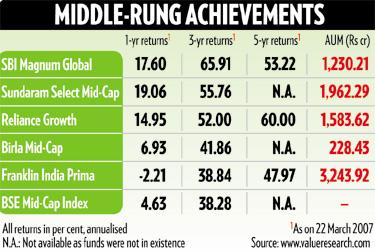|
|
| Help | |
| You are here: Rediff Home » India » Business » Special » Features |
|
| |||||||||||||||||||||||
|
| |||||||||||||||||||||||
The Indian mutual fund industry has seen funds deliver three-digit returns in March 2006. Sundaram Select Midcap Fund and Prudential ICICI Emerging Star Fund, among others, posted 111 per cent and 114 per cent annual returns.
But they were hit hard by the slump after this period. Although their recovery after May 2006 crash has been slow, it's time to take a look at them again. Mid-cap stocks are now quoting at 15.14 times earning, whereas the Nifty rules at 17.70 times earnings. So shouldn't these funds form part of your portfolio? Yes, but don't forget the risk involved. A few pointers on how to walk this road.
How do mid-cap funds work? The core strategy of mid-cap related funds is to identify and invest in companies that have just embarked on the growth curve. For example, an investor who invested in Shree Cement at the beginning of the bull run in 2003, when it was trading at around Rs 47, would make a packet today with the stock trading at Rs 1,100.
However, you need to keep in mind that for every Infosys or Bharti that made the grade there is a Himachal Futuristic or a Pentasoft Tech that did not. (Himachal Futuristic has fallen from Rs 73.90 in June 2002 to Rs 21.20 on 22 March 2007. Pentasoft has fallen from Rs 13.40 in December 2002 to Rs 1.50 now).
This is where mid-cap oriented funds come in. Fund managers of these funds are expected to not only identify such opportunities for investment, but also recognise danger signs early enough, and take corrective steps.
A good fund manager will be able to separate the wheat from the chaff among the many mid-cap stocks and correctly time the entry and exit into these stocks, which a retail investor may not be able to do.
Risky deals. These funds come with a higher risk. When markets fall, the stocks that are the underlying investment for these funds tend to fall much more, making the segment very volatile.

For example, from June 2006 to February 2007 the Sensex gained 64 per cent while mid-caps such as Polaris Software went up by 314 per cent, Maharashtra Seamless by 118 per cent, and Kesoram Industries by 202 per cent. These are prominent picks of many mid-cap related funds. However, between February and March, when the market slid down by 15.6 per cent, these stocks lost 26.12 per cent, 12.5 per cent and 36.5 per cent, respectively. Apart from price distortions, the liquidity constraint also means that fund managers may have a problem selling large holdings.
Too much on the plate. A fallout of the high returns that these funds have generated is the exponential growth in the assets managed (AUM) by them. Top ranking funds in the category, like Reliance Growth and Sundaram Select Mid-cap, have AUMs in excess of Rs 1,500 crore (Rs 15 billion) and have seen their assets grow by more than 10 times in the last few years.
The large size poses problems in finding enough good and undiscovered mid-cap stocks, and in exiting from an illiquid market. Mid-cap related funds that have been in existence for at least three years have comfortably beaten the benchmark returns as well as the returns from their counterparts in the large-cap segment. But, their performance in the last one year reflects slow recovery since the May 2006 crash.
Starting point. The mid-cap segment is a good investment opportunity for long-term investors who have considered both the returns and the risks. Select the fund carefully. Evaluate it based on its past ability to pick winners early, rigorous filtering, selection, review and other risk mitigation procedures.
Before you decide to invest in a mid-cap oriented fund, remember that it cannot form the foundation of your portfolio. It should be included only to the extent permitted by your risk profile in order to enhance the returns from your portfolio.
More Specials
Powered by

|
|
| © 2007 Rediff.com India Limited. All Rights Reserved. Disclaimer | Feedback |